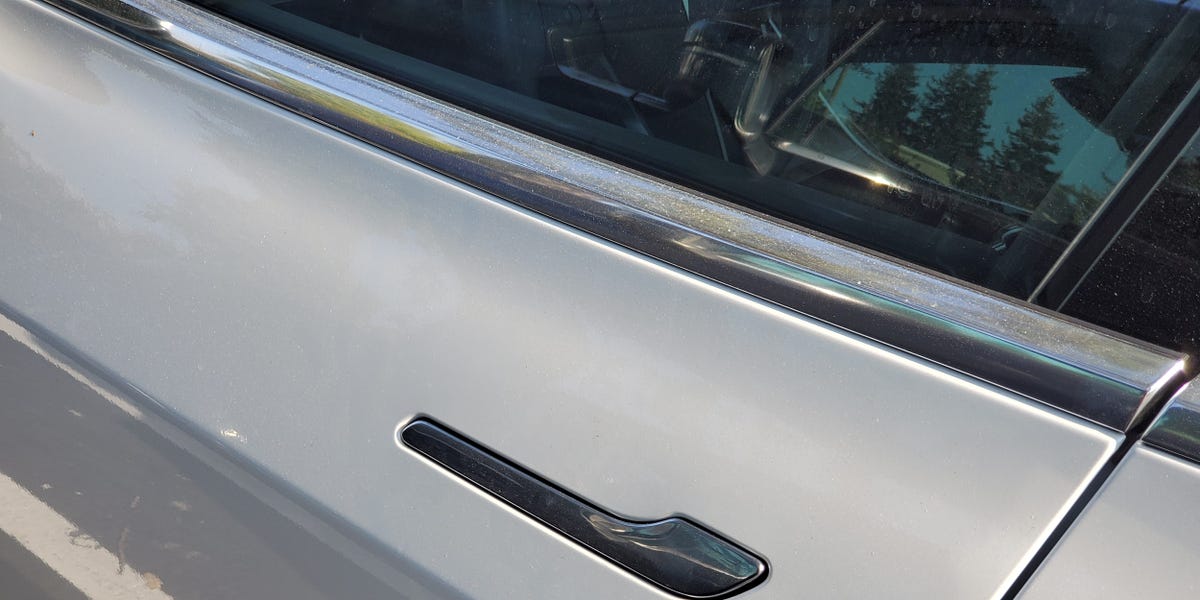Numerous Tesla owners have said they’ve been stuck inside their EVs after the cars suddenly lost power.
YouTuber Tom Exton claimed that his Tesla Model Y ordered him to pull over before it suddenly lost power and left him unable to exit.
Exton followed the instructions for the manual release to open the door, but he said this “somehow broke the driver’s window.”



Tesla’s retract the door handle for better aerodynamics. So you can’t open it mechanically from the outside without the handle to hold. I don’t know how the inside works. Plus they don’t have mechanical keys, so the lock is already electronically controlled.
Maybe instead of engineering stupidly complex electronic door handles they could just, I don’t know, design a simple mechanical door handle that is also aerodynamic? These gimmick “features” automakers keep insisting on add pointless mechanical complexity, pointless areas of failure that are expensive to repair, and aren’t even something many consumers care about, or in many cases are overly complex hassles they actively don’t want.
I’d be interested to see how much actual power savings you get from a more aerodynamic door handle anyway, but it seems that this could be handled by a simple locking flip down cover over a recessed handle if the savings is actually non-negligible.
A flip down cover may be an option, but I’d worry about ice build up. How do you make sure you can always open the cover? If you add a mechanical assist, your back to your original problem.
I think it’s likely the vibe and aesthetics though that caused Tesla to go with their super sleek ones over some sort of cover.
You add drag any time there’s a divit in the panels. There’s lots of vortexes and disruption that happens just because of how your hand is shaped and where it needs to go.
There might be a better way to do it, but the other car companies haven’t done anything yet that I’ve seen to drastically reduce the drag from the handles.
Customers want range and saving money. If it does that without extra hassle, it makes sense. But that’s still up in the air. Especially with Tesla’s anti right to repair making things more difficult all around.
It’s also completely possible to make entirely mechanical non-electronic flush car door handles. They’re less of a shiny gimmick than the electronic ones, and less convenient than many standard handle types, but are entirely possible to do. You could also hypothetically do a version that is both electronic and manually operable with the same components, entirely negating the stupidity of an electronic door opener with an entirely separate mechanical backup, provided you are willing to sacrifice frameless windows.
I doubt that door handle contribites anything measurable to the aerodynamics of the car. The truth is that musk thinks it looks cool regardless of how annoying it is if anything goes wrong.
I found a 12% figure. Aerodynamics are a primary driver of range, which is a major ev selling point. A 12% drag decrease is huge, because you can carry less battery which means you can have a smaller motor, lighter frame, leading to even more range. So it would be very important if that is true.
https://www.businesswire.com/news/home/20180105005468/en/Top-3-Drivers-of-the-Global-Automotive-Retractable-Door-Handle-System-Market-Technavio
You can still have protrutionless handles without making them electronically retractable. Just have a spring-loaded metal flap that you push in with your hand
You’ll still get the icing issues, where you need to be able to get in even with a thick layer of ice over the handle. But that does sound like a really good solution otherwise.
I find it hard to believe that 4 door handles (being made flush with the door), reduces drag by 12% . Are there other articles you can share?
That’s just what Google came up with, sorry. I don’t have time to research more right now. I do know a rear view mirror on an f350 has more drag than an entire Tesla, so aerodynamics are not always intuitive.
That’s a plausible claim. If you find it hard to believe, maybe you should go back to the wind tunnel.